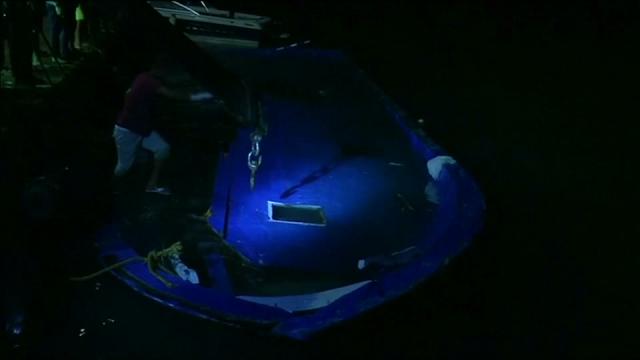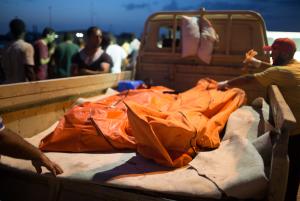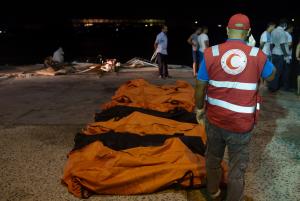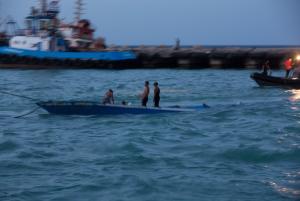ZUWARA, Libya (AP) — Libyan authorities were collecting the bodies of migrants who drowned off the western coastal city of Zuwara, with some 200 feared dead on Friday in the latest disaster involving desperate people trying to reach Europe across the Mediterranean.
An Associated Press photographer at the scene saw workers removing bodies from the water, and pulling a flooded boat into the harbor that contained several drowned victims floating face down. At least one victim, a man, was wearing a life vest. They were put into body bags and lined up on the waterfront.
Hussein Asheini, the head of Libya's Red Crescent in Zuwara, said at least 105 people were killed, some while trapped inside the boat after it capsized. Fishermen and the coast guard found the waterlogged vessel at sea and towed it back to Zuwara, where they had to break the ship's deck to reach people trapped inside.
"The boat sank out at sea, and a coast guard team is still diving in and checking inside to see if there's anyone else," he said. There were conflicting casualty figures and the Red Crescent was still counting the bodies and the survivors, he added.
In a statement, the United Nations refugee agency said that up to 200 people were missing and feared dead after the Libyan coast guard carried out rescue operations Thursday for two boats carrying an estimated 500 migrants.
Othman Belbeisi, chief of mission for the International Organization for Migration for Libya, said in a statement: "We are still waiting for more details, but we have learned there were 400 people on one of two boats."
He said 100 were rescued, including nine women and two girls.
The head of passport control police in Zuwara, Anwar Abu el-Deeb, said his organization has no contact with the Italian or any other coast guard in coordinating efforts to stop the smuggling. He also said he's unable to estimate the number of boats that leave the city because they depart in secrecy.
The Libyan coast guard does not have enough ships and equipment needed to tackle the issue, while the coast guard in Zuwara is not in operation, said Ayoub Qassem, the spokesman for the navy of Libya's Islamist-backed Tripoli government, which has been fighting a separate internationally recognized government in the East.
"The coast guard's capabilities are very weak and that's what contributes to the rise in migration, in addition to the security situation in the country," said Qassem. Libya needs "real cooperation" including in the southern Libyan border "to lay siege to the problem which is exhausting Libyans," he said.
"The process is organized and carried out by gangs with various citizenships that are taking advantage of the situation in Libya, along with smugglers from Libya," he said.
Most of the people rescued came from Syria and sub-Saharan African countries, said Mohamed al-Misrati, the spokesman for the Red Crescent in Libya.
"You can imagine what they are going through. Some of them are still looking for their friends. We're trying to speak to them but many of them are too traumatized to even talk about the incident," said al-Misrati. The Red Crescent is trying to provide psychological assistance, in addition to food and water in shelters they were moved to, he said.
In a separate rescue operation by the Libyan coast guard on Wednesday, UNHCR said 51 people were found dead of suffocation in the hold of a boat, with survivors recounting how smugglers beat them with sticks to keep them under the deck. It said one survivor described how smugglers forced passengers into the packed hold and were demanding money to allow them to come up to breathe fresh air.
Dozens of boats are launched from lawless Libya each week, with Italy and Greece bearing the brunt of the surge of migrants.
Two Libyans accused of human smuggling were arrested in Zuwara on Thursday, a security official in the town said, without providing further information. He requested anonymity because he is not authorized to brief reporters.
Human smuggling of people fleeing conflicts and poverty in the Middle East and sub-Saharan Africa from Libya has spiked, as smugglers take advantage of the turmoil in Libya to use it as a staging ground for departures to Europe in rickety, overcrowded boats.
Since the 2011 overthrow and killing of longtime dictator Moammer Gadhafi, the oil-rich north African country has plunged into chaos. It is divided between an elected parliament and government based in the eastern port city of Tobruk and an Islamist militia-backed government in the capital Tripoli. Militants from the Islamic State group are also exploiting the chaos.
"As a result of Libya's armed conflict, stopping the 'death boats' cannot be done only by Libya. There must be an international effort to curb this issue," said the Red Crescent's al-Misrati.
___
Associated Press writers Jamey Keaten in Geneva, Brian Rohan in Cairo and Esam Mohamed in Tripoli contributed to this report.



